#disregard 'green is not a creative colour' this is the thing i am against
Text
AND DON'T EVEN GET ME STARTED on writing erotic povs of 'problematic content.'
I'm sorry, but if you write exclusively as a soulless narrator with politically correct and culturally moral opinions, your writing is boring. Give your narrator some spice! Yes, you can write murder erotically. Yes, you can write a cute wholesome scene like its the most disgusting thing in the universe from the narrator's perspective. You can write a mean narrator that pokes fun at the reader. You can write a weirdly maternal narrator that holds your readers hand and is meant to come off as mildly patronizing. You can write a sarcastic narrator, or an extremely blunt narrator. You can even write a narrator that is some insane political extremist. It's fiction. Creative writing. So be creative.
Write characters who's thought processes and actions are awful and make them look appealing. Write scenes that are relatively normal and make them look scary or strange. Please just write with some shred of creativity.
I need to go to the fucking library and read some good classics before I go fucking crazy. Y'all do not know how to just let go and enjoy the artistic process and it Shows. Everything is a reflection of you as a person. You always feel watched and judged. In the age of the internet, I guess it's understandable. (D'ya see what I did there, sympathetic to a problematic character-- in this case, the audience that wants to kill art for its wild spirit?)
Anyway here's a writing prompt:
Write a narrator that isn't Your Social Face. Bonus points if the narrator is telling the story very differently from how the characters or scenery do. Put your whole pussy into it bro.
And remember. The narrator is a character, too. And that character does not have to be You.
#narration#writing prompt#anti anti#anti purity culture#anti puritan#freedom of expression#art#social commentary#im sorry but so much stuff is becoming soulless now it scares me#morality police#start thinking creatively -quoting dhmis#disregard 'green is not a creative colour' this is the thing i am against#rant#scathing criticism#literature#making art#waxing poetic#toward the end there#writing tips#do whatever you want#forever#be creative#virtue signaling#american culture#internet culture#shaking you#please for the love of god stop being scared of art embrace the chaos adore the craft
72 notes
·
View notes
Photo
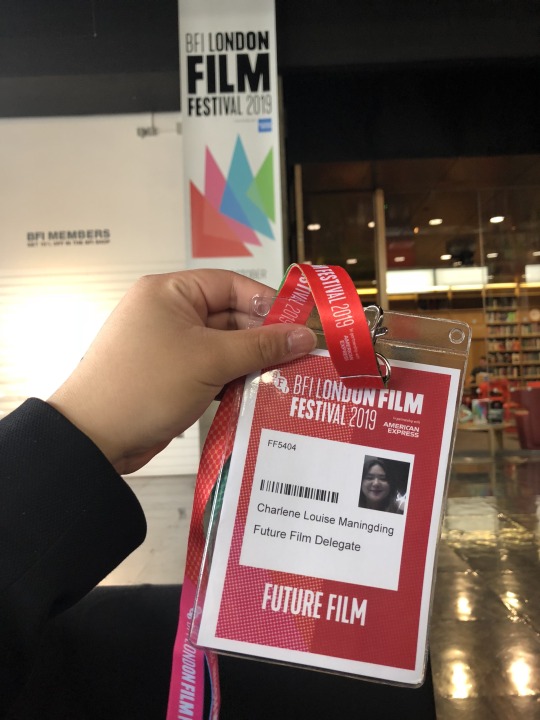
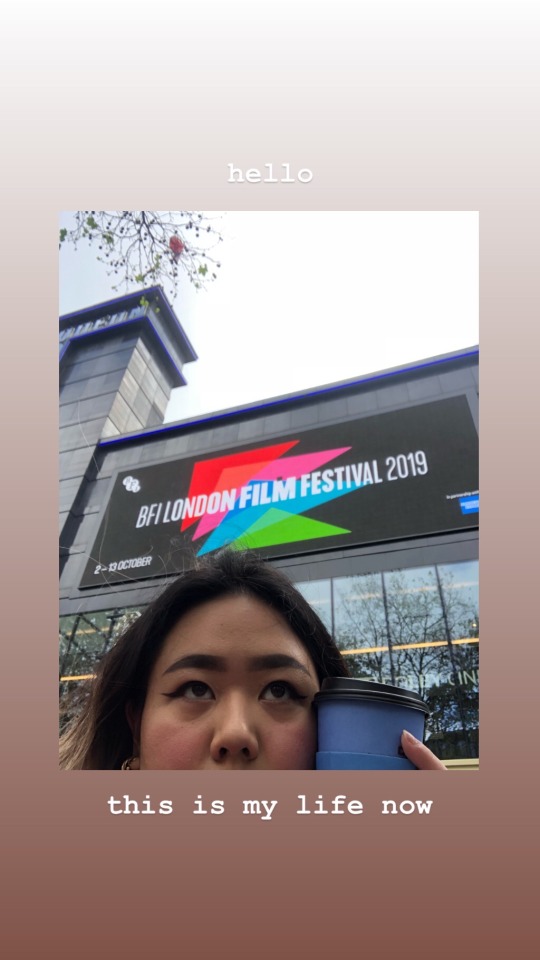
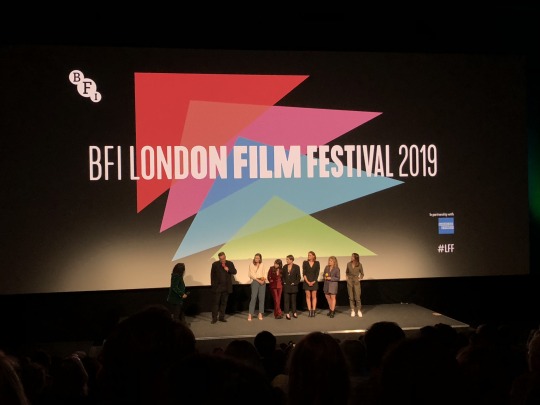
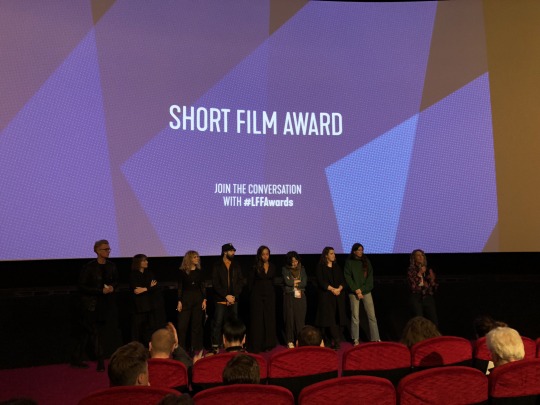
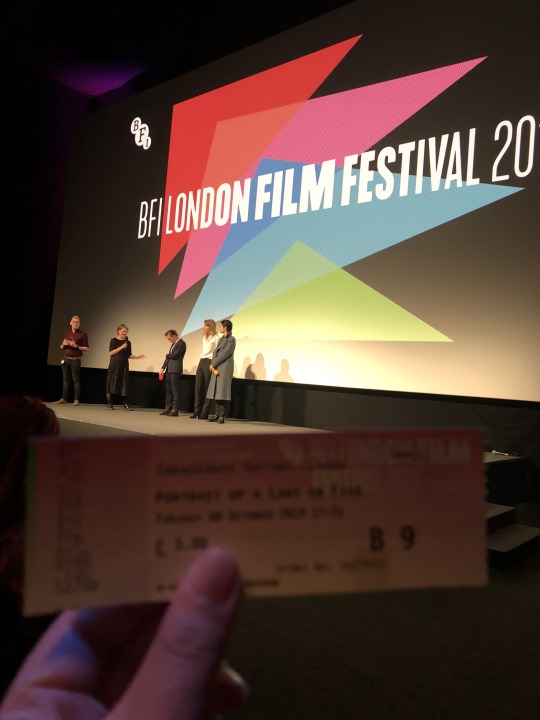
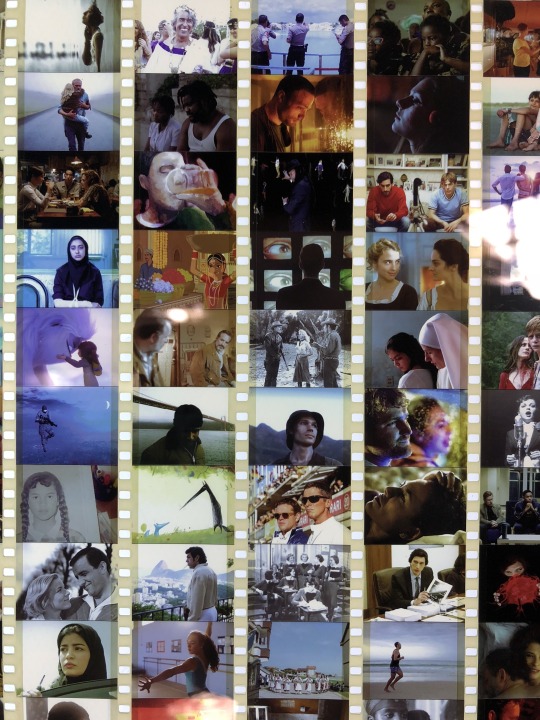
Personal Practice:
London Film Festival 2019: Review
2 - 13 October 2019. This is potentially one of my favourite times of the year.
For me, its such an important period in my calendar - not only professionally but personally. I find film festivals a wonderful way of watching or accessing films. There is almost an organic way to it: seeing it with fresh eyes, everyone being in the same boat or seeing it before everyone else, not influenced by other people’s comments or opinions (on the film being screened). It allows me to have a pure experience with the film. I am able to cultivate my own ideas on it and evaluate it later on down the line. It feels much more like a richer experience.
Also, I simply love the buzz that it involves. The conversations had, emotions shared and the people you meet. From the screenings to the red carpet, I feel like there is a good sense of community. I find festivals a wholesome, exciting experience. Also, I feel a lot closer to my aspirations as a filmmaker in this setting. It makes me feel hopeful.
Most importantly, it reminds me why I love the art form in the first place. Being united by one thing before them and seeing the natural reaction among crowds, this is something rare - especially in a world that often feels “lonely" and when there seems to be very little reason to be united about.
Of course, in the time of digital distribution and binge-watching, these new found ways of distribution has its own positives. This is particularly true in reach; on demand viewing makes cinema a much more democratic experience. For instance, they enable niche, independent films to be seen by those who live in remote places or do not have access to independent cinemas without the need of travelling to major cities like London or New York. Both methods of viewing, on demand and via the cinema, are equally important and has their own strengths. At the end of the day, as long as the film is being shown and reaches its audience - that’s all that matters. However, there is still must be said about the cinema experience and the magic it offers. In its darkness and the glow of the projector, you get to escape and enter another world momentarily - live out the ordinary you know of. Film festivals, to me, is cinema viewing in its purest form and preserves that experience.
I was also lucky to be in the presence of the filmmakers themselves in some of my screenings. In the special presentations and Q+A sessions that followed the screening, they were able to contextualise their films and share the process behind the choices they make. I learned a lot from them and its a good educational experience.
In this year’s programme, I was able to watch the following films…
I have also included some initial thoughts and comments from my notes for future reference.
Our Ladies (Dir. Michael Caton-Jones) - Drama/Comedy
Heartwarming! Such a good feel-good film. Close to my heart as I come from Catholic education and has female friendship at the heart of it. It shows what good casting can do and proves it’s an equally important creative choice. The main ensemble really carried the film and a great part of what makes it so charming. Can’t wait to watch again!
The Lighthouse (Dir. Robert Eggers) - Horror/Drama
Excellent, well-crafted sound design. Quite wild for an 8am viewing. The framing and composition of the image are done with great precision; it’s quite stunning to watch and I couldn’t look away despite feeling sheer terror at times.
Make Up (Dir. Claire Oakley) - Psychological Drama
Unfortunately unable to finish the film due to scheduling conflict. Promising story against a holiday park backdrop and brings to light seaside small town life (which is often overlooked). Interesting blend of genre.
Premature (Dir. Eashaad Ernesto Green) - Drama
Most disliked film from my viewing. Although I appreciate the authentic portrayal/visibility of Black youth in what seems to be an alternative of New York city life (away from the glamourised, white lens), the story is so underwhelming. Too tragic at times and pacing was dull. Lots of unnecessary shots (especially during intimate scenes) that served no purpose aside from catering to the male gaze - a complete disservice to the strong female lead its meant to be portray.
House of Us (Dir. Yoon Ga-eun) - Drama/Family
A tender story. Told from children’s point of view which is so refreshing to watch; it served as a nice reminder that children are whole people too, with their own thoughts and valid feelings - which I often forget. As a society, we often disregard them for being dependent or “incomplete”. Although I found myself being annoyed at the children, the film really makes you empathetic. Colour grading is divine; has a childlike brightness that honours the story and the lens its being told. Followed similar style to “Florida Project”, where a lot of the image is shot a low height to resemble children’s perspective.
Marriage Story (Dir. Noah Baumbach) - Drama/Comedy-Drama
Good performances from Johansson and Driver. I particularly loved the opening as it symbolised the beginning of the end for the couple. It had a wonderful attention to detail too (the letters). Baumbach is a good screenwriter and hits the lines where its suppose to be (e.g. fight at the apartment near the end of the film, although Charlie says such childish things - its reflective of the truth/a natural reaction to such event).
The Kingmaker (Dir. Lauren Greenfield) - Documentary/Drama
About Philippine politics. Made me feel so angry as it hits so close to home, which still affect me and my family today. Clever structure. It begins by almost mocking Imelda Marcos which gives it a comedic effect and a lighthearted touch - necessary to tackling a heavy subject. However, it unravels slowly and leaves you with a gut punch feeling in the end, hitting you cold hard facts and what reality is for the ordinary Filipino people - away from Imelda’s rich and flamboyant world. It made me want to start a revolution.
The Disappearance of My Mother (Dir. Beniamino Barrese) - Documentary
A story told in a such loving lens. An interesting study on the relationship (of Benedetta Barzini) with the camera - especially as a model and now through her filmmaker son’s lens. Raises the questions: how to be seen, how would you like to be seen, to what level or depth you can actually be seen. Nice mix of archive and interviews. I like the imperfect shots the most where the filmmaker just carries the camera - shaky, unbalanced; it makes it feel more intimate.
And Then We Danced (Dir. Levan Akin) - Romance/Drama
Warm and tender. Beautiful colour grading that matched the essence of the film - delightful yellow tones. Such an important story to tell and captured the zeitgeist of today (lgbt love story/coming of age in one of the most orthodox countries in the world - Georgia). Respectful portrayal of Georgian dance and traditions; shown with honour and pride. Closing scene is so moving and strong; it captures him coming to terms with his identity - both as a dancer and as a queer person. The desire told in this story is multifaceted - his desire to become the best dancer and his desire for Irakli.
Portrait of a Lady on Fire (Dir. Céline Sciamma) - Romance/Drama
A compelling story. I’m always fascinated by strong stories that is held together by a small ensemble or little cast. It reminds me that as long as you have a solid story and characters with depth, you don’t need a lot to make it a fulfilling and rememberable. Bursting with colour. Every frame feels like a painting. The cinematography has a beautiful kind of stillness; I appreciate this so much as it feels like a complete antithesis to society/our current way of life. So refreshing to see the female gaze in its full glory. Closing scene is so moving and powerful - similar to Luca Guadagnino’s Call Me By Your Name. This really stayed with me.
Overseas Documentary (Dir. Yoon Sung-A) - Documentary
Interesting background - Belgian/French production about a Filipino story, told by a Korean director. I really enjoyed the observational eye this documentary is told; allowing the story unfold by itself. It enabled the people to tell their story; the most authentic and truthful lens.
Lingua Franca (Dir. Isabel Sandoval) - Drama
Promising work from Sandoval. Another important story worth telling, especially since its a minority story (trans, undocumented woman in America, trying to get a Green Card/be legalised; how this is a dehumanising process). However, I find that it focused too much on tragedy. Also, editing felt off at times or left too ambiguous.
Matthias + Maxime (Dir. Xavier Dolan) - Drama
A pretty loud film. Lots of talking. Production Design is kind of weird as it doesn’t put a timestamp on the story (not sure if it was the 80s or early 2000s?). Perhaps this is to make the story timeless? But a part of me just found it a bit confusing. Strong casting and the ensemble is captivating to watch. I liked how the root of what happened to Matthias and Maxime wasn’t shown to show how it affected them after and the kiss wasn’t sensationalised. It made their kiss later on much more impactful (in relation to the build up). Nice story but not Dolan’s best.
Dogs Don’t Wear Pants (Dir. Jp. Valkeapää) - Drama
Interesting experience. Offered a much more in-depth perspective on BDSM, on a personal/humanising standpoint that is beyond pleasure. Production Design was excellent. Cinematography is so precise and there’s a clear visual language shown. Hard story to get into and the pacing is quite slow, with a sudden rush near the end of the story.
Rocks (Dir. Sarah Gavron) - Drama/Youth
Beautiful cast and has girls from minority backgrounds at the heart of its story - something that British cinema is yet to improve on. Interesting that the ensemble is made up of mainly non-actors to keep the youthful spirit alive. Making process is certainly interesting. However, the story is pretty much a given and I find that it focused too much on tragedy.
A Hidden Life (Dir. Terrance Malick) - War/Drama
Slow cinema; nice contrast to the world and pace of life we all lead. Stunning cinema throughout: crisp sound design and cinematography feels like a painting, honouring nature and the environment. Really keep the senses alive. I like the use of the “active camera” (tracking shots, handheld), during the points of the film where it was the most joyful - it truly captured the beauty of life. Lots of upward shots, featuring the sky - something quite holy and feels omnipresent. I like how the bond between the husband and wife is portrayed by the letters, which carries the story forward - a nice technique.
Personal favourites:
Tier 1: Our Ladies, And Then We Danced, Portrait of a Lady on Fire, The Kingmaker
Tier 2: Matthias + Maxime, Lingua Franca, The Lighthouse
_______________________________
Additional viewings: Short Film - Programme 1 and 2
Programme 1:
If I Knew / What do you know about the water and moon / White Girl / Fault Line / Gu04 / In Vitro
Programme 2:
Algorithm / Between / In Between / Child / Watermelon Juice / Queering in Teknolojik
Seeing the Short Film Programme is also important in my professional development as its much more closer to where I am at in my practice. It showed me the kind of stories that are currently being told by my contemporaries and opens me up to new techniques or alternative ways of storytelling. Its always a eye opening experience and pushes me out of my comfort zone, widening my knowledge. It raises the questions: how can I do things differently? What makes this technique or story particularly strong? What do I like about this? What do I dislike about this? What are the key elements which makes me drawn to it. These questions and observations will help me shape and refine my practice. I hope to apply these in my next film and I look forward to what is next.
_______________________________
In the following year, I look forward to attending Cannes Film Festival (May) and Sundance London (May/June). Film festivals continue to have a special place in my heart.
0 notes
Text
At worst, take this as a bit of fandom history?
Alright I’m pretty tired but it finally hit me that some antis legitimately believe that people are shipping a 25yo with teenagers and I’m still a bit dumbstruck. Then I mused a bit and realized it’s probably a fandom background/generational kind of thing, and this post was born. I’d appreciate if you read through it, and if you want I'm always open for discussion as long as it’s civil.
There’s two main points I want to make on this post:
1) Creators’ words outside of the source content being automatically “canon” is a fairly recent thing. As in, last 2-to-5 years recent, and in new fandoms only. It’s not global.
If you go back to older and not-so-older fandoms, you'll see that most of them disregard stuff the creators have said outside of the source material or even source material content if it’s OOC, illogical, contradicts previous canon, etc. If a showrunner or a writer said something in a convention or in an interview, this wasn’t taken as canon and people didn’t assume that other people would know and adopt this information as official content, for a multitude of reasons.
We’re talking about creators queerbaiting/colourbaiting and saying or teasing outside of the books/shows/etc that a character was LGBT+ or Latin@ or something of the sort and getting kudos for being inclusive without any of the backlash.
We’re talking about creators saying all sorts of canon-contradicting bullshit outside of the source material just because, or because they couldn’t even be bothered to keep up with the material they were supposed to be writing for.
We’re talking about something having multiple creators and each having different views on the content and contradicting each other and even the very source material.
We’re talking about creators taking a look at the headcanons and ships the fandom was creating and not liking them and doing everything to squash them to the ground.
I could cite a few examples, starting from queerbaiting on shows like Supernatural and Sherlock, the whole thing with Moffat and Doctor Who, Butch Hartman downright banning people and shutting down all LGBT+ headcanons and ships he sees of his shows for over a decade now, writers and producers Bryke for A:TLA stiffling the other writers and the pre-planned progression of the show in favour of their ship, even stuff like (NSFW) JK Rowling going ahead and tweeting that group masturbatory sessions in the Hogwarts dorms were a thing.
None of this is particularly new. Creators putting stuff out there outside of the published material has been going on for as long as anything resembling fandom has existed. I’ve gone a bit more into this and the Death of the Author trope here.
Something that has also been going on as long as this is fandom creators taking all this, ignoring it, and doing their own thing. Creators say a character is definitely, for-sure, no take-backsies cis and straight? Nope. Trans and gay. Non-binary and ace. I’ve seen y’all doing this with Pidge even though she’s the one character to have canonly (in the source material) come out as any gender at all. Hermione has mentioned to be pale and to tan in the books? Let’s make her black. Alya’s family is from Martinique? Cool, it aligns with my headcanons but I’m not gonna push it into anyone else. Trans!Danny Fenton has been shut down by the creator in social media so hard you got whiplash? Keep putting him in binders, my dudes. This spreads to stuff like what the characters like to do for fun or their favourite colour or their birthdays. (you will pry hunk being cancer from my cold, dead hands.) Or, you know, ages.
People used to be legitimately sued and doxxed for writing fanfiction at all because it deviated from the creator’s original vision, the likes of Anne Rice making people afraid to post fanfiction for years, so that we’ve come this far and that we’re able to headcanon and take creative liberties with other people’s characters or worlds speaks a lot. This isn’t just about social justice and inclusivity. Extra skills for a characters? AU fics? Couldn’t. Coffeeshop slowburns included, considering it ruins the “integrity” of their work.
You see where I’m going with this, and this leads us to my second point.
2) Your opinions and feelings aren’t invalid, but I’ve met nearly no shaladin/pidge shippers who took the general ages lineup as canon. Though, to be fair, i don’t deal with all of them so I’m generalizing things a bit. You’ll notice I won’t mention She!th and that’s because I haven’t interacted with them.
I can assure you right now that, for example, Shidge shippers in general are grossed out at even thinking of a 14/25yo relationship. A good portion of them are even CSA survivors or minors, so you can see how much they’d like the mere idea of it. Shunk and Shance shippers, from what I’ve seen, don’t tend to roll with the “canon” ages either. If you’d like to argue that Shiro is coded as a clear adult or that Pidge is coded as a kid as opposed to the other paladins being late teens, I’ve argued against that in my comments here so feel free to take a look. If you’d still like to contest another point, I am more than willing to discuss your point and make my own.
I can sum up one half of this point like this: show a shaladin/pidge shipper a 14/25yo relationship, and they think it’s gross. A good portion think the same of 16/17/25. That they’re shipping shaladin/pidge ships regardless just comes to show that they really don’t see the age lineup as an actual thing.
You have all the right to still feel uncomfortable with these ships or dislike them, though! It’s not for me to tell people what to like or not, nor to decide what affects them and their personal experiences or not. You also have the right to keep thinking that the age lineup is official and canon!
Picture the “creator’s word is canon” debacle like this: for me, the sea is blue. For you, the sea is green. Why? It depends on the depth of the waters, the weather, the environment beneath the waves, pollution degrees, etc. Neither of us is wrong here, but it depends on our own experiences and perceptions. In this case, those factors would be these: fandom background, personal opinions, previous headcanons, your own cultural background, and degrees to which you relate to a character. With a bonus of whether you think the creator is the worst thing since standardized testing or not, for some fandoms.
I’ve explained the fandom background on my previous point, but here’s a tl;dr: on recent fandoms and for people new to fandom, what the creators say goes; with less recent fandoms and fans, people do their own thing and only adopt what is said in the source content as canon, with the rest being taken as strong headcanons but not official canon. There are fans who even ignore sequels or certain episodes of their source materials due to it not fitting their standards.
This, coupled with the rest, obviously brings clashes of opinions, and sadly enough harrassment from both parts. Yes, I’m not discounting that there are shippers that are downright nasty, it’s a terrible reality we don’t have control over. We’re not a hive mind, and neither are you.
I’m not writing this to get any of you to ship or not ship a thing. I just want people to know where others are coming from, and you should respect other people’s history, culture, and experiences regardless of your opinion on the ships or on whether what creator’s say outside of the source material is canon or not.
Throwing around suicide-baiting and harmful terms such as ‘pedophilia’ is unarguably not a good thing, especially when you’re attacking minors and csa survivors along the way. You need to respect that not everyone has the same background as you, and as such the age lineup isn’t canon for a good portion of the fandom and this does not make them pedophiles or supporters or anything resembling that.
Respect. Other. People’s. Backgrounds.
#voltron#voltron legendary defender#anti shaladin#anti-shaladin#anti-shidge#shaladin#voltron wank#howl rambles a lot#howl salts a lot#i'm so tired i feel like i keep running with my head against a wall time and time again
82 notes
·
View notes